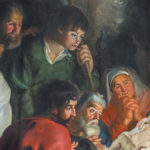The period from the fateful moment of the fall in the Garden of Eden to the momentous event of the Messiah’s birth stretched for untold eons. “Long-awaited” provides a striking characterization of Jesus the promised Savior. This first of four lessons, that recall some of the beloved hymns of Christmas, is based primarily on passages from Micah but also reminds us of the song, “Come, Thou Long-Expected Jesus.”
Prophet Micah lived and preached in the southern kingdom, Judah. He spoke to a people under siege, one of the basic strategies for taking a city in ancient times. In a siege, a city was cut off from outside provision and help by the enemy’s surrounding army. Assyria had defeated and enslaved the northern kingdom, Israel. The Assyrian king, Sennacherib, had come against King Hezekiah who refused to submit to the Assyrians. The city of Jerusalem was under siege until the plague sent from God devastated the Assyrian army and spared Jerusalem. Micah promised deliverance from the most severe threat.
Adults often feel under siege. Health issues, financial problems, relationship strains, cultural changes and spiritual crises loom as threats. In the presence of these threats, many adults feel hopeless, stressed, fearful, lonely, insignificant and weak. Adults need the security that comes from God’s provisions of significance, care (shepherding) and forgiveness (salvation).
Security through significance (Micah 5:1-3)
Micah may have alluded to the siege of Jerusalem by Sennacherib in 701 B.C. or may have been looking forward to the Babylonian invasion of 596 B.C. His message in either case is that God would rescue his people in the face of siege, oppression or exile.
Micah addresses the city of Jerusalem. Some translations use the term, “Daughter,” in reference to the city that is under attack. The inhabitants will slash themselves in grief, a ritual that expressed mourning. The invaders would strike the judge (leader) of Israel on the cheek (the worst of all insults). The nation would fall and exile loomed. What a moving description of a people who had lost significance!
The prophet relieved these fears. You, “Bethlehem, Ephrathah,” although small and seemingly insignificant, would become foremost as the place for the birth in the coming of Messiah.
Bethlehem’s insignificance may have stemmed from small size and the inability to provide as many as 1,000 soldiers or the fact that it was a small clan among the people of Judah. The term “Ephrathah” may have related to a clan in the region or may have been an older settlement absorbed into Bethlehem.
While insignificant at the time, the Messiah would come from this town, the home of David. Bethlehem probably means “house of bread.” From Bethlehem would come the Deliverer, the Messiah. God answers need by his Messiah who exists from eternity to eternity (v. 2). Although God would allow his people to suffer exile, God’s planned and promised Messiah would deliver them.
When adults feel they have lost significance, they can rest assured God still has meaningful service for them, and in God’s will there is only significance. In God’s will, everyone is someone.
Sign up for our weekly edition and get all our headlines in your inbox on Thursdays
Security through care—shepherding (Micah 5:4-5)
Human rulers can disappoint. God’s Deliverer would “stand,” that is, be installed and remain in power forever. This Messiah would “shepherd,” that is care for by providing necessities, protection and guidance. This care will be in the “strength of Yahweh” and in the “majesty of his name.” Under the care of Messiah, God’s people will live “securely,” that is, settled and undisturbed by danger. This security is assured by God’s power that “extends to the ends of the earth.” God’s Messiah will be their “peace.” In Jesus, we have tranquility, safety, wholeness and total well-being.
Adults can fall into the traps of feeling self-sufficient or feeling weak and unable to cope. Often, self-sufficiency disappears in the stresses of life. Fears arise in the face of threats. Adults can experience care and security that God provides in Messiah. We can trust his power, love and care. We can know security through the loving shepherding of our Master—a message important during the Christmas season.
Security through forgiveness—salvation (Micah 7:18-20)
The greatest security anyone can have is the assurance of acceptance of God through the forgiveness of sin. Only Christianity delivers this message of security and assurance. Micah asks “Who is a God like you?” The answer, “No other exists.”
God provides the security of this salvation by exercising his unique qualities. God removes (picks up and carries away) the iniquity (the wrong directions and crooked actions) of people. God set aside human rebellion by not holding his anger forever. God’s anger is not a human emotion but his consistent and eternal opposition to wrong behavior. God delights in expressing his unchanging love that results in acts of grace and mercy. God will express his compassion (tender love) as a mother does to a child. God will remove the peoples’ sins and throw them into the sea. In these loving actions, God shows his steadfast love and his faithful promises to the nation.
Adults today should seek God’s forgiveness of sin and restoration into the presence of the Lord. No greater security is possible.
Adults should accept Micah’s promised security—the promise of continuing significance in God’s kingdom, of his unceasing protection and provision as our shepherd, and of unending and complete forgiveness of sin. We have enduring security when we trust God.












We seek to connect God’s story and God’s people around the world. To learn more about God’s story, click here.
Send comments and feedback to Eric Black, our editor. For comments to be published, please specify “letter to the editor.” Maximum length for publication is 300 words.